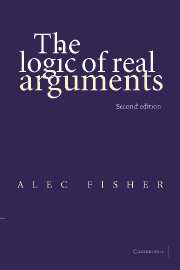Book contents
- Frontmatter
- Contents
- Preface to the first edition
- Preface to the second edition
- Acknowledgements
- 1 Introduction
- 2 A general method of argument analysis
- 3 A first example – from Thomas Malthus
- 4 Reasoning about nuclear deterrence
- 5 An example from John Stuart Mill
- 6 Arguments about God's existence
- 7 How do your mind and body interact?
- 8 Suppose for the sake of argument that …
- 9 An example from Karl Marx
- 10 Evaluating ‘scientific’ arguments. Some initial examples
- 11 Philosophical assumptions
- Appendix: Elementary formal logic
- Exercises
- Bibliography
- List of further reading
- Index
3 - A first example – from Thomas Malthus
Published online by Cambridge University Press: 05 June 2012
- Frontmatter
- Contents
- Preface to the first edition
- Preface to the second edition
- Acknowledgements
- 1 Introduction
- 2 A general method of argument analysis
- 3 A first example – from Thomas Malthus
- 4 Reasoning about nuclear deterrence
- 5 An example from John Stuart Mill
- 6 Arguments about God's existence
- 7 How do your mind and body interact?
- 8 Suppose for the sake of argument that …
- 9 An example from Karl Marx
- 10 Evaluating ‘scientific’ arguments. Some initial examples
- 11 Philosophical assumptions
- Appendix: Elementary formal logic
- Exercises
- Bibliography
- List of further reading
- Index
Summary
If the present world population doubles itself every twenty-five years, in 150 years' time there will be standing room only since the number of people will be greater than the number of square metres on the land surface of the Earth.
In this chapter we show how to analyse and evaluate a very famous argument due to Thomas Malthus (1766–1834) and we apply and develop the method of Chapter 2 in the process. Malthus's father was a friend of David Hume and of Jean-Jacques Rousseau, both of whom visited his house together when Thomas was only three weeks old. It was under the influence of Rousseau's Emile that his father had Thomas privately educated until he became an undergraduate at Jesus College, Cambridge, at the age of eighteen, in 1784. He graduated well in mathematics in 1788, and he took Holy Orders in the same year. His Essay on the Principle of Population as it affects the Future Improvement of Society with Remarks on the Speculations of Mr. Godwin, M. Condorcet and other Writers was first published in 1798. There was much discussion at that time – in the wake of the French Revolution – about the possibility of establishing a society based on social and economic equality. Malthus's Essay originated as a polemic against such utopian speculations. His argument was not new,
The most important argument that I shall adduce is certainly not new. The principles on which it depends have been explained in part by Hume, and more at large by Dr. Adam Smith.
- Type
- Chapter
- Information
- The Logic of Real Arguments , pp. 29 - 47Publisher: Cambridge University PressPrint publication year: 2004



